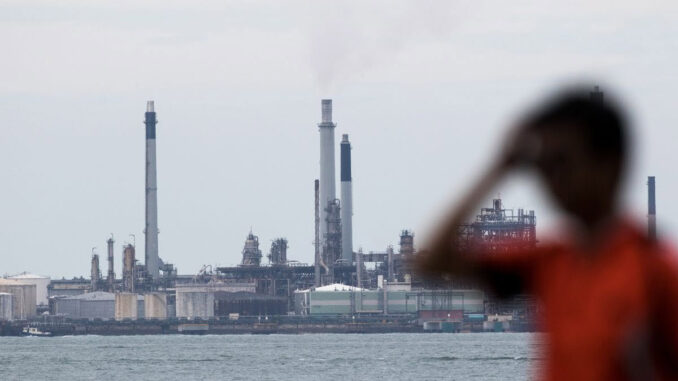
Asian refineries are grappling with what’s expected to be a brief period of weak profits as a demand-sapping Covid-19 comeback across the region coincides with a likely surge in oil-product exports from Iran.
The virus resurgence in India and other nations apart from China is reducing consumption of products such as gasoline and jet fuel, squeezing the profit margins of refiners. The market is also bracing for the possibility of a boost to Iranian fuel oil supplies into Asia should a nuclear deal be revived.
That’s led to complex refining margins in Singapore, a proxy for Asia, falling from $1.65 a barrel at the end of April to as low as 3 cents in mid-May. While it’s a setback for processors recovering from the pandemic, margins have rebounded slightly and are expected to resume an upward trajectory as soon as the third quarter with accelerating vaccination rates aiding demand.

The average profit from converting crude into gasoline in Asia — the so-called crack spread — fell in May from April, snapping a three-month gain. Across the region, restrictions in place from Malaysia, Vietnam to Japan sapped demand for transportation fuel, with oil consultancy FGE seeing India’s gasoline consumption as the “biggest stumbling block to Asia’s demand recovery” with an estimated 20% fall in April through June versus the previous quarter.
“Export is not a very attractive option,” said N. Vijayagopal, the finance director at Bharat Petroleum Corp., India’s second biggest fuel retailer. Refiners across the country are facing a double whammy caused by weaker regional markets and lower domestic consumption that’s prompting them to set aside earlier plans to maintain run rates and reduce operations instead.
Complex refining margins in Singapore were at 80 cents a barrel on Friday and have averaged 71 cents in May. That compares with $2.41 in the same period in 2019, prior to the pandemic. The profit from converting crude to gasoline in Asia was at $7.89 on Monday and have averaged $8.47 in May.
Iran Flows
Most are expecting a flood of crude should the nuclear accord be renewed with Iran, but it’s the prospect of rising fuel oil flows — used to power ships and for electricity generation in some countries — that’s raised concerns for Asian refiners, especially as China boosts output of heavy fuel.
Margins for very low-sulfur fuel oil dropped below $10 a barrel in mid-May for the first time since December, easing from a high of almost $16 at the end of February. Cracks in May were also at the lowest average in five months. Margins for high-sulfur fuel oil fell as low -$8.80 in May, from -$3.71 in April.
Diesel demand, most notably from China, is proving to be the bright spot and has provided a buffer for overall margins. Consumption in Asia during the first three months of the year was at 9.4 million barrels a day, or about 98% of 2019 levels, and is expected to edge higher during the second quarter, according to Yuwei Pei, a consultant at Wood Mackenzie Ltd.
Singapore’s stockpiles of middle distillates — a category that includes diesel — fell through the week ended May 26 to the lowest since April 2020. Covid-19 restrictions and the return of refineries after seasonal maintenance may lead to rising Asian inventories, but regional diesel cracks could increase $3 to $4 a barrel to as much as $10 by December, according to Wood Mackenzie.
“As the Covid-19 situation in Asia stabilizes and restrictions are eased, improvement in cracks of transportation fuels should support both simple and complex refining margins through the third quarter,” said Grayson Lim, a senior oil market analyst at FGE.
— With assistance by Debjit Chakraborty – Source Bloomberg



